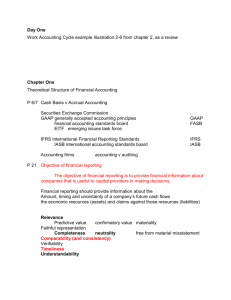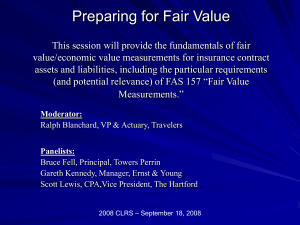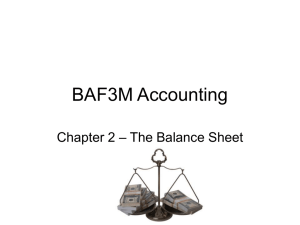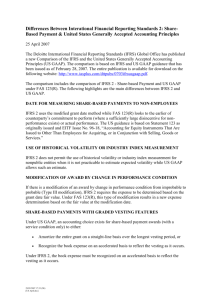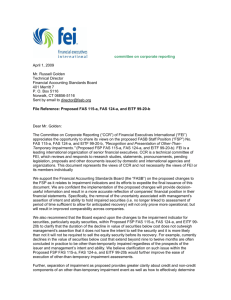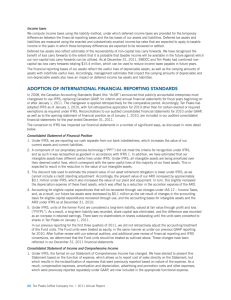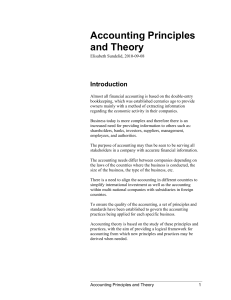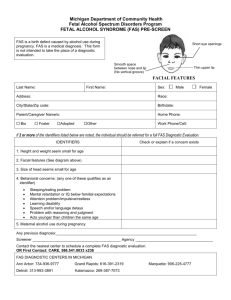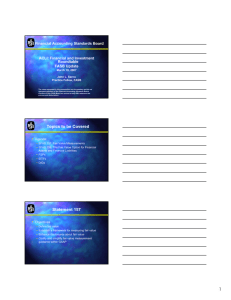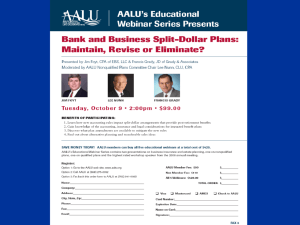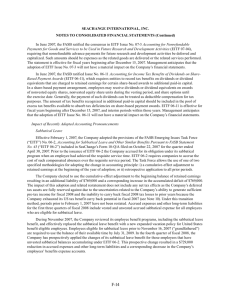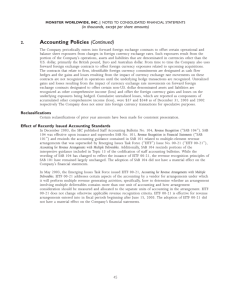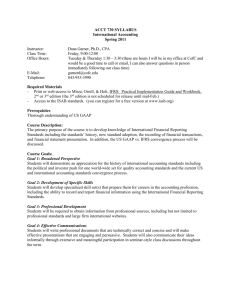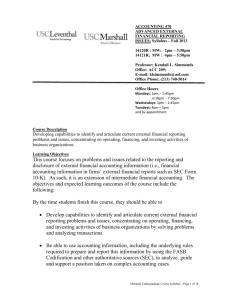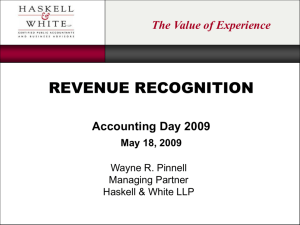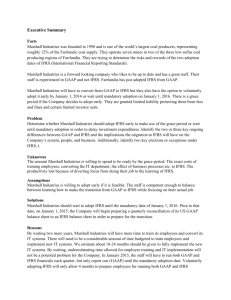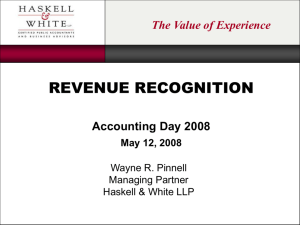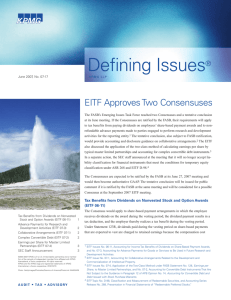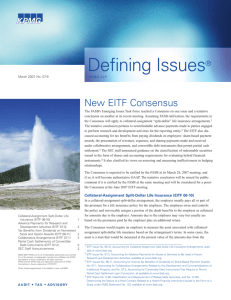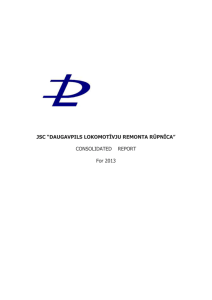CFO Roundtable 03/06/08
advertisement
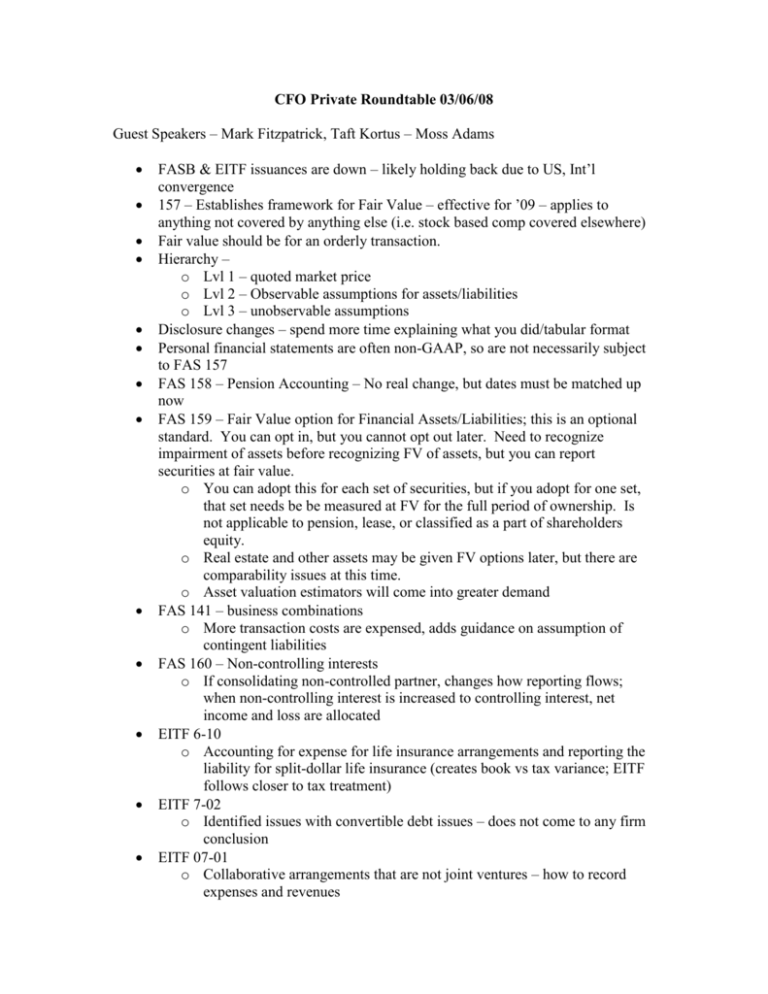
CFO Private Roundtable 03/06/08 Guest Speakers – Mark Fitzpatrick, Taft Kortus – Moss Adams FASB & EITF issuances are down – likely holding back due to US, Int’l convergence 157 – Establishes framework for Fair Value – effective for ’09 – applies to anything not covered by anything else (i.e. stock based comp covered elsewhere) Fair value should be for an orderly transaction. Hierarchy – o Lvl 1 – quoted market price o Lvl 2 – Observable assumptions for assets/liabilities o Lvl 3 – unobservable assumptions Disclosure changes – spend more time explaining what you did/tabular format Personal financial statements are often non-GAAP, so are not necessarily subject to FAS 157 FAS 158 – Pension Accounting – No real change, but dates must be matched up now FAS 159 – Fair Value option for Financial Assets/Liabilities; this is an optional standard. You can opt in, but you cannot opt out later. Need to recognize impairment of assets before recognizing FV of assets, but you can report securities at fair value. o You can adopt this for each set of securities, but if you adopt for one set, that set needs be be measured at FV for the full period of ownership. Is not applicable to pension, lease, or classified as a part of shareholders equity. o Real estate and other assets may be given FV options later, but there are comparability issues at this time. o Asset valuation estimators will come into greater demand FAS 141 – business combinations o More transaction costs are expensed, adds guidance on assumption of contingent liabilities FAS 160 – Non-controlling interests o If consolidating non-controlled partner, changes how reporting flows; when non-controlling interest is increased to controlling interest, net income and loss are allocated EITF 6-10 o Accounting for expense for life insurance arrangements and reporting the liability for split-dollar life insurance (creates book vs tax variance; EITF follows closer to tax treatment) EITF 7-02 o Identified issues with convertible debt issues – does not come to any firm conclusion EITF 07-01 o Collaborative arrangements that are not joint ventures – how to record expenses and revenues EITF 07-03 o Accounting for non-refundable R&D payments – Should be recognized as expense over life of services (deferred recognition) EITF 07-04 and 06 – o How to account for items linked to stock price FIN 48 o Applies to tax positions under FAS 109 o Only deals with federal income taxes – how to account for potential liabilities, disclosures, reporting reserves for uncertain tax positions, reporting for interest and penalties o Publics adopted for 07, Privates are to adopt for 08, if you think there will be a cumulative effect, privates must report for 07 o Can lead to a discussion of probability approach (largest benefit with more than 50% prob of occurring) or materiality discussion Many new audit standards – increased auditor work, increased documentation of controls and procedures for companies SAS 114 – Auditor’s communication with those charged with governance – significant audit findings (see slides) Convergence – US is only country who has not adopted IFRS (International Financial Reporting Standards). IFRS may be different between some countries, US objected and wants stronger standards from other countries. SEC has eliminated IFRS to US GAAP rec for foreign filing companies Revenue recognition is less stringent for IFRS, US seeks to tighten up those rules in IFRS Where can you see differences between GAAP and IFRS standards? Moss Adams will provide documentation, Nancy will provide to members via email. IFRS is often less onerous than US GAAP, but can be more so (long lived assets, for instance) Current projects: o Codification of GAAP o Conceptual framework o Revenue recognition o Financial statement presentation – possible change in Income Statement? o Leasing Transactions o What qualifies as Liabilities vs Equity – as bankers come up with debt vs. equity instruments Many changes to tax code under stimulus act o Quicker depreciation to encourage investment State & Local Tax – What’s your source of information? Auditor? Currently, must figure out taxes based on customer address rather than wholesaler/manufacturer address XBRL – Real time financial reporting; likely to not have impact on private companies, but may affect public companies Gift cards – Localities have laws regarding these accruals Tax theme – Had CEO with low salary, took dividends instead. Tax auditor looked, but did not ask for change; can work for S Corp or LLC to avoid 2.9% No changes with Fin 46 and Variable Interest Entities Current Topics – o Equipment leases for high tech – can allow higher equipment turnover for tech companies, but can also be lease – purchase agreement Who is feeling slowdown in economy? o Radio is slowing o CFO selections is faster o Group consensus – Seattle is stronger right now than many other areas in US o Woods Creek has not seen softening o Speakeasy small business segment has not slowed o Suburban single family housing is down -Seeing some movement toward multi-family o Freight forwarding – commercial business is up, military business is down o Gene Juarez is very slightly up
